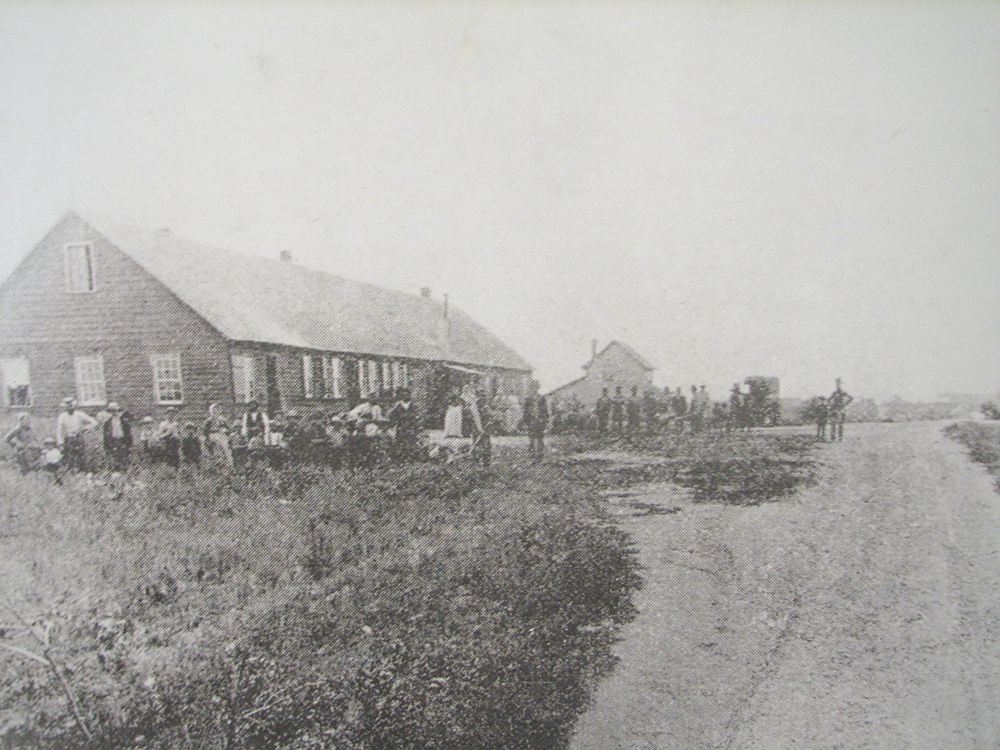HISTORIC ALLIANCE COLONY, CELEBRATES MILESTONE ANNIVERSARY WITH AUGUST 12 PICNIC

First Successful Colony of Jewish Farmers in the United States
Event Sponsored by Alliance Colony Foundation and
Jewish Federation of Cumberland, Gloucester & Salem Counties
VINELAND, NJ—It started in 1882 with a group of Russian Jews fleeing the pogroms in Czarist Russia and establishing for themselves a better life working the land in rural South Jersey. Now, that Alliance Colony—the first successful colony of Jewish farmers in the United States—will be celebrating a milestone.
A 136th anniversary picnic celebration, organized by the Alliance Colony Foundation and the Jewish Federation of Cumberland, Gloucester & Salem Counties, will take place on Sunday, August 12, from 1 to 5 p.m., at the Alliance Cemetery grounds, 970 Gershal Ave., Norma.
This celebration, to be held rain or shine, will include barbecue chicken platters, hot dogs, live klezmer music, a bounce house, face painting, and much more for young and old. Special presentations will take place, booths will have Alliance material and memorabilia, and people will be able to see historic sites that are part of the Alliance Colony. Reservations are $18 per adult and $9 per child under age 12. To RSVP, call the Jewish Federation at 856-696-4445.
The Nature of the Milestone
A milestone such as this is traditionally commemorated as a yoval—Hebrew for “jubilee”—and customarily takes place every 50 years. Indeed, a celebration took place in 1932, which included some of the original colonists and their children. The commemorative Yoval souvenir book published at the time was a chronicle of those first years of Jewish pioneer life there, containing articles by some of the surviving colonists, contemporaries, and children of the settlers.
Likewise, a Centennial Jubilee took place on August 11, 1982 at the cemetery. For this event, the Jewish Federation combined its annual picnic with the Jubilee. The day, according to the invitation, included a commemorative program, a tour of historic sites, a video presentation, a display of memorabilia, old-fashioned games, a picnic-style dinner, and swimming in the Maurice River. The 1982 Yoval souvenir book reproduced the original 1932 book and included a preface by Centennial Chairman Jay H. Greenblatt. Greenblatt, grandson of Alliance Colony pioneer Jacob Greenblatt, is founder and president of the Alliance Colony Foundation.
With the descendants of the original colonies passing away or moving, however, it was decided to hold the next celebration just 25 year later, with a picnic in 2007. At that time, the last surviving native of the original Alliance Colony, Lillian (Greenblatt) Braun, was still alive, and her 100th birthday two years earlier, had been celebrated near and far. Featuring many of the same types of events as the Centennial Jubilee, it was also a time to recall the early years of the colony and the pieces of history that survived to the present day. The souvenir book for 2007 again included the original 1932 edition, interviews by Sandra Posnak with Sheva (Crystal) Kotok and Samuel Crystal, as well as a 1982 article by Mollie (Greenblatt) Kravitz.
The upcoming celebration, 11 years later, marks a century and double chai (chai being a Hebrew term meaning “life,” the Hebrew letters of which add up to the number 18). Like those in the past, this event will blend the colony’s sense of history with the spirit of continuity that makes it a cultural anchor for those Jewish families who first established roots there generations ago and whose roots still can be found there—even if just a name on a cemetery plot.
Though little remains of the Jewish life that was so much a part of the area, with the names of the sections of the Alliance Colony—Norma, Brotmanville, and Six Points— just points on a map for many, the area’s Jewish roots are still to be found. Some street names give it away—Gershal, Brotman, Steinfeld, Eppinger, Rosenfeldt, Abrams, Seligman, Shiff. The Alliance Cemetery became the final resting place for the original colonists and their immediate families. The synagogue across the street is still kept up.
With time, however, some changes have taken place. As subsequent generations of the original colonists moved to the cities—Vineland, Millville, Bridgeton, and beyond—people from other cultures, races, and creeds have replaced those earlier generations. The Brotmanville Synagogue, for example, is now a Baptist church. Time moves ahead in its own way.
The Alliance Colony’s Roots
Tracing the Alliance Colony’s roots means traveling back Czarist Russia of the late 19th century. The assassination of Czar Alexander II in 1881 brought on a series of pogroms against Russian Jews. These people were forced to leave Russia and many came to the United States to start life anew. Many reestablished themselves in New York City, mainly in the Lower East Side.
The crowded conditions of the cities’ tenements, however, made many of these early immigrants feel confined. The desire to leave the crowded, teaming cities took root. The feeling also existed to become free of those who were exploiting them as they labored for their bosses in the cities. Instead, they should move to the country where they could specialize in agriculture, work the land, and be self-sufficient in areas that were mainly Jewish. They settled in areas throughout the United States
The early Alliance Colony, however, was much more than settlers tilling the soil. Some of the residents specialized in blacksmithing, while others were masons and cabinet-makers. Also, a clothing factory was established by Abraham Brotman, in what became known as Brotmanville.
By 1892, adults at Alliance numbered 660, with well over 300 children, some of whom were married. Almost 80 farms were situated on almost 2,000 acres of land.
To educate the children, several schools opened and, to provide places for worship, three synagogues were established before the turn of the century, as well as a cemetery for burial of the deceased.
Alliance has contributed some Americans of prominence. Chief among these were Joseph Perskie, the first Jewish member of the New Jersey Supreme Court, critic Gilbert Seldes, his brother, journalist George Seldes, and the Bayuk brothers, who founded Bayuk Cigars, which produced Phillies cigars.
Eventually, many of the descendents of the Alliance settlers moved to establish Jewish communities in Vineland, Millville, Bridgeton, and beyond. These descendents became doctors, lawyers, store owners, and other tradespersons while, at the same time, establishing Jewish communities in their places of residence.
The roots of all these people, however, point back to the Alliance Colony, where many have returned for their final resting place.
From the Alliance Colony’s humble beginnings in 1882, the Jewish agricultural movement gathered momentum. Other colonies soon established themselves throughout South Jersey. They, too, all point back to the Alliance Colony.
“The establishment and success of Alliance Colony is an example of how the American Dream can become a reality,” Greenblatt said.


